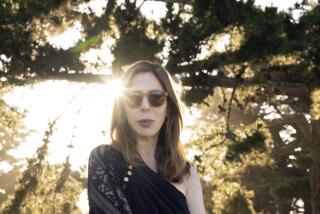Review: In ‘The Snow Queen,’ Michael Cunningham wrestles with life
While wandering through Central Park after getting dumped by his latest romantic fixation, Barrett Meeks, the aimless 38-year-old gay protagonist of Michael Cunningham’s new novel, “The Snow Queen,” has what seems to be, even to his proudly secular mind, a mystical experience: “There it was. A pale aqua light, translucent, a swatch of veil, star-high, no, lower than the stars, but high, higher than a spaceship hovering about the treetops.”
Because this scene is set in fall 2004, just before the election that will give George W. Bush a second presidential term, Barrett doesn’t rip out his smartphone and search Twitter for drone sightings. He does check the evening news when he gets home to the Brooklyn apartment he shares with his older brother, Tyler, and Tyler’s seriously ill girlfriend, Beth. But his Twilight Zone encounter hasn’t hit the news cycle.
What exactly happened to Barrett? “The sky regarded him, noted him, closed its eye again, and returned to what were, as Barrett can only imagine, more revelatory, incandescent, galaxy-wheeling dreams.” His fear is that the incident was “nothing, a blip, an accidental glimpse behind a celestial curtain, just one of those things.” But even if this is some kind of divine text message, how will Barrett, an underemployed Yale grad who spends most of his free time pondering either his rotten luck with men or his inability to stay interested in an occupation longer than a few months, ever unlock its meaning?
A yearning for the transcendent runs throughout Cunningham’s fiction. His characters always seem to be seeking a portal in the everyday for a glimpse at the eternal. Think of Clarissa, from Cunningham’s Pulitzer Prize-winning 1998 novel, “The Hours,” running errands through Greenwich Village in the same meditative manner of her strolling London predecessor from Virginia Woolf’s “Mrs. Dalloway,” keenly alert to the “crush and heave” of the “endless life” encompassing her.
A better comparison might be with New York art dealer Peter Harris from Cunningham’s 2010 novel, “By Nightfall,” which centers on a character who, like his author, is conscious of “the unending effort to find a balance between sentiment and irony, between beauty and rigor,” in the quest to “open a crack in the substance of the world through which mortal truth might shine.”
Although its characters have a habit of relating tales that make life seem stranger than fiction, “The Snow Queen” resembles “By Nightfall” in its desire to provide urbane literary entertainment without too much stress or strain over form. Big questions are nonetheless posed on this compact canvas, in which spiritual mystery is set beside related Dionysian subjects such as artistic creation, drug use and, of course sex (of a not especially satisfying variety, it must be said).
Writing about such matters is a tricky proposition. Cunningham largely avoids the traps of new age mumbo jumbo and sentimentality through a commendable display of negative capability, the fancy Keatsian term for a thinker’s capacity for “being in uncertainties, Mysteries, doubts, without any irritable reaching after fact and reason.”
“The Snow Queen” is a novel that keeps ironically pointing out the inability of characters to predict the future, yet it remains compassionate toward the human need to impose provisional narrative order on the random flux of life. Barrett, suddenly “prone to Signs of Significance,” can’t help wondering if Beth’s cancer remission is somehow related to the light he saw in Central Park. (Yes, he’s a bit of a narcissist, like most everyone in this novel of aging bohemians desperate to unmire themselves in their middle years.)
Tyler, feverishly at work on a wedding song for his beloved that will at once express the depth of his feelings and fulfill the promise of his artistic gifts as a composer, is seeking control through creativity and falling steadily into addiction.
More a collection of traits — fading good looks, benevolent masculinity, frustrated creative ambition — Tyler is mostly seen in symbiotic relation to Barrett, who seems willing to sacrifice worldly achievement for the possibility of a complementary love. Their childhood is sketched in a manner that can seem a little too thematically convenient. (Barrett and Tyler’s mother was killed by lightning, giving them an early lesson in the baffling yet suggestive code of the universe.)
What Cunningham does get right is the way an addict’s life becomes a tissue of rationalized lies. Admirable too is the way he shows that even the closest of brothers, bunking together in not-quite-gentrified Bushwick in the shadow of a loved one’s illness, can remain something of a mystery to each other. Barrett will grow furious upon discovering that Tyler is still using, but Tyler will feel equally indignant that Barrett kept from him the strange vision that he related to others far less close to him.
The plot of “The Snow Queen” depends a good deal on discoveries about the past and the fateful turns of the future. The choices characters make are consequential, but individual agency can get lost in the bend of time. This gives the book a curious tempo. The first part proceeds slowly with finely detailed descriptions while the final section, set four years later, gallops forward with a soap opera-ish slew of surprises and reversals.
This is an odd work, engaging in parts and shot through with stunning lyricism, yet testing in the problematic personalities it brings together. The resolution Cunningham bestows is not unlike that otherworldly light in Central Park — subject to interpretation and dependent to an unusual degree on a character’s capacity to hold on to hope.
The Snow Queen
A novel
Michael Cunningham
Farrar, Straus and Giroux: 258 pp., $26
More to Read
Sign up for our Book Club newsletter
Get the latest news, events and more from the Los Angeles Times Book Club, and help us get L.A. reading and talking.
You may occasionally receive promotional content from the Los Angeles Times.










